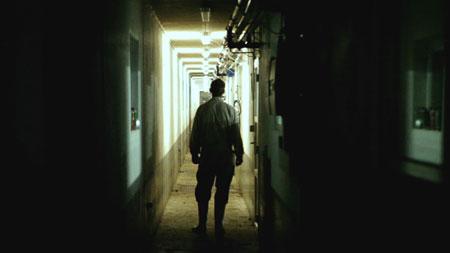"Pig Country" introduces us to Jacob, 29. A pig farmer like his father and grandfather before him, Jacob runs three farms and owns vast tracts of land. He sends large numbers of pigs to the slaughterhouse every week – and he owes the bank 6.5 million euros, far more than his assets are worth.
"What attracted me was the story of a young, visionary farmer trying to develop his family's farm and suddenly finding himself in a situation where he has put his family's future at risk."
Danish agriculture is changing. Medium-sized farms are disappearing and soon all that will be left are huge industrial farms and gourmet niche operations. Farms like Jacob's, stuck in the middle, will either be shut down or acquired by bigger outfits.
"What attracted me was the story of a young, visionary farmer trying to develop his family's farm and suddenly finding himself in a situation where he has put his family's future at risk," director Andreas Koefoed says. So much is on the line for Jacob. He has been responsible not only for his own destiny but also for that of the 20 or so close family members who farm his lands. If he goes bankrupt, they stand to lose their livelihoods, too.
"Jacob has been innovative and visionary, but he also had the bad luck of investing in new land and new farms at the wrong time. The recession, with falling land and property prices, has left him with a huge debt that he will never be able to pay back. There is really not much he can do, because the matter is out of his hands now. All he can do is hope the bank will give him a little more time, while he tries to reassure his family hoping that the prices on pigs will rise," the director says.
Capturing Subtle Nuances
"Pig Country" depicts a life that will be familiar to many Danish farmers in the year 2010. But to create a whole, well-rounded cinematic narrative, Koefoed employed devices from narrative film.
"I tried to imagine how a natural story would play out and constructed certain scenes in advance," Koefoed says. "How do you convey that Jacob is in crisis? What scenes will show that he is working to solve his problems? What scenes can be used to show whether he will succeed? We needed scenes with bankers, with his accountant, with his family, as well as scenes from the barn. And of course, there are powerful scenes that happen simply because you're around – like the one where Jacob has to put down a pig."
Jacob's waiting for an answer and his inability to control his own destiny are the core of "Pig Country". But for the same reason, it was a huge challenge for Koefoed to push Jacob's story forward.
"Jacob is under extreme pressure, but he is the kind of person who doesn't talk about it when he is going through a tough time. You have to read everything out of the tiniest facial expressions. Country people are not wont to make a fuss. That was a definite challenge. You want them to blow up, but there's almost nothing like that and I was concerned that the whole thing would be too underplayed," he says.
Moreover, the story has no external engine or natural momentum. Jacob can't just work harder and sell more pigs. He has a problem, but he can't solve it himself.
"We worked a lot with mental images, scenes where Jacob's inner turmoil bubbles up to surface, as in the film's nightmare scene or the scenes of Jacob just staring out across his fields and barns. That is where we get a chance to move up close and capture the nuances of Jacob's character and create intimacy," Koefoed says.
"Pig County". Framegrab
The End of Farm Life
"I saw Jacob's story as a kind of modern tragedy of Danish farm life. Behind it looms the end of an era in Danish history, as bucolic living, ancestral farms, close family ties and so on are being uprooted because of the general development, increased competition, heightened environmental standards and recession. It's the story of a young man's possible fall and the story of a society in change. That's what spins my crank," Andreas Koefoed says.
Koefoed has been a regular contributor to IDFA in recent years. This is the fourth film he takes to the festival. His past films have looked at everything from boys' choirs, hookah culture and serious illness. This year, Koefoed is coming to Amsterdam with a portrait of a nation's agriculture that's under threat and at risk of total collapse without political intervention or a sudden upturn in the economy.
"That's what I find truly amazing: Jacob has set everything up as efficiently as possible. He almost single-handedly produces hundreds of pigs a week, but he still can't turn a profit, because conditions in farming are so tough. It's a huge taboo, though pretty much every farmer is in the same predicament," Koefoed says.
Andreas Koefoed is serving as a jury member in the IDFA Competition for Student Documentary 2010.


